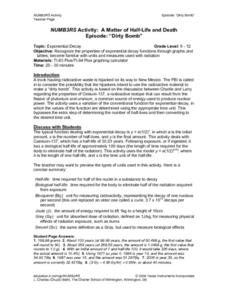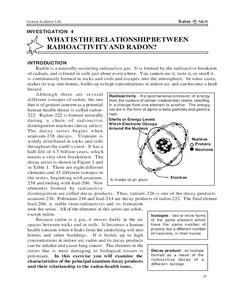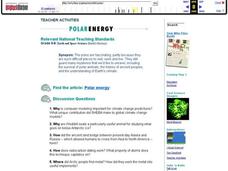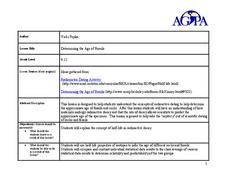Virginia Department of Education
Radioactive Decay and Half-Life
Explain the importance of radioactive half-life as your high school biologists demonstrate the concept by performing a series of steps designed to simulate radioactive decay. Pupils use pennies to perform an experiment and gather data....
Curated OER
Teaching Radioactive Decay: Radioactive Half-life And Dating Techniques
Students generate a radioactive decay table for an imaginary element using a box filled with pinto beans and M&M's. They use their data to plot a decay graph, develop the concept of half-life, and use the graph to "age" several samples.
Virginia Department of Education
Isotopes
Lead your class through the amazing world of isotopes as they investigate the various properties they contain and further understand their respective location on the periodic table. They explore half-lives and radioactivity as each...
Curated OER
NUMB3RS Activity: A Matter of Half-Life and Death
Students investigate exponential decay. Students explore the biological half-life of Cesium-137. Students investigate the Goiania Accident of 1987 which is considered one of the worst incidents in the history of the Atomic...
Curated OER
Radioactive Decay and Half-Life
Students describe how the mass of a radioactive isotope changes with time and the factors that affect the rate of radioactive decay. They write nuclear decay equations to represent natural transmutation. This activity is accomplished...
Curated OER
Earth Structure and Materials
Students explain what is meant by term nuclear radiation, describe in detail electromagnetic spectrum, differentiate between ionizing and non-ionizing radiation, understand half-life of isotopes, differentiate between processes of...
Curated OER
What is the Relationship Between Radioactivity and Radon?
In this radon and radioactivity worksheet, students analyze the data of the isotopes of elements that occur in the decay series of uranium-238. Students answer 6 questions about the isotopes, their half-lives, their potential threat and...
Virginia Department of Education
Determining Absolute Age
How can radioactive decay help date old objects? Learners explore half-life and radioactive decay by conducting an experiment using pennies to represent atoms. Young scientists graph data from the experiment to identify radioactive decay...
Curated OER
Earth's Age: The Dating Game
Students conduct a simulation to determine radioactive decay and half-life. Using pennies, dice or sugar cubes as isotopes placed in shoe boxes simulating rocks, they hold five trials representing 1000 years each to find the theoretical...
Curated OER
Polar Energy
Students define and read an article on polar energy. In this polar energy lesson, students answer questions about the article. Students participate in activities related to isotopes, half-life and radiocarbon. Students...
Curated OER
Radioactive Decay: A Sweet Simulation of a Half-life
Students demonstrate rates of decay of unstable nuclei can be measured. They understand ratios and multiplication of fractions. They simulate radioactive decay. They read about the accomplishments of scientists.
Curated OER
Radioactive Simulations
Students simulate radioactive decay and nuclear power using an on line interactive web site. In this on line lesson plan, students monitor radioactive isotopes and record the activity of a particular element as the decay progresses. They...
Curated OER
Isotopes of Pennies
Students demonstrate that isotopes of an element have different masses. They illustrate atomic mass and neutrons. The periodic table is examined in length. Display of a collection of atoms is surveyed.
Curated OER
Determining the Age of Fossils
Students examine the concept of radioactive dating. In this radioactive dating instructional activity, students investigate how to determine the ages of fossils and rocks as they learn about half-life radioactive decay.
Curated OER
Radioactive Decay
Students generate a radioactive decay table for an imaginary element, use their data to plot a decay graph, develop the concept of half-life, and use the graph to "age" several samples.
Curated OER
Absolute Dating/Radioactive Dating
Students explore radioactive decay. In this radioactive atoms lesson students complete a lab to help them understand the relationship between radioactive atoms vs stable atoms.
Curated OER
Elements and Compounds
Students explain how radioactive decay occurs. In this physical science lesson, students simulate radioactive half-life through an experiment. They graph their data and share their results in class.
Curated OER
Frosty the Snowman Meets His Demise: An Analogy to Carbon Dating
Students read and discuss an article about carbon dating, then participate in a hands-on lab to discover how carbon dating works. Students also write a letter to a friend explaining the process, and how archeologists use the process to...
Curated OER
What Is Radon?
Students examine what radon is and which isotope it belongs. They discuss the characteristics of isotopes in general and the atomic number. They complete a worksheet to complete the lesson.
National Museum of Nuclear Science & History
Alphas, Betas and Gammas Oh, My!
Referring to the periodic table of elements, nuclear physics learners determine the resulting elements of alpha and beta decay. Answers are given in atomic notation, showing the atomic symbol, mass, atomic number, and emission particles....
Curated OER
Finding the Ages of Rocks and Fossils
Students practice dating fossils. They learn the concept of "deep time"--that earth was formed billions of years ago. They experience excellent hand-outs and virtual age tutorial links.
Curated OER
Earth System Science
Students investigate the age of the earth by using accepted scientific methods. They conduct research about the use of radioactive dating and there is a simulation activity of the process. Finally, students measure the radioactive decay...
Curated OER
A Phylogenetic Perspective for the Cladistically Challenged
Students use M&Ms to simulate radioactive decay of elements.
Curated OER
Chemical Reaction
For this chemical reaction worksheet, students label the missing particles as natural decay, induced, fission, or fusion. Students calculate the energy change for the given reactions. This worksheet has 6 fill in the blank and 4 problems...

























